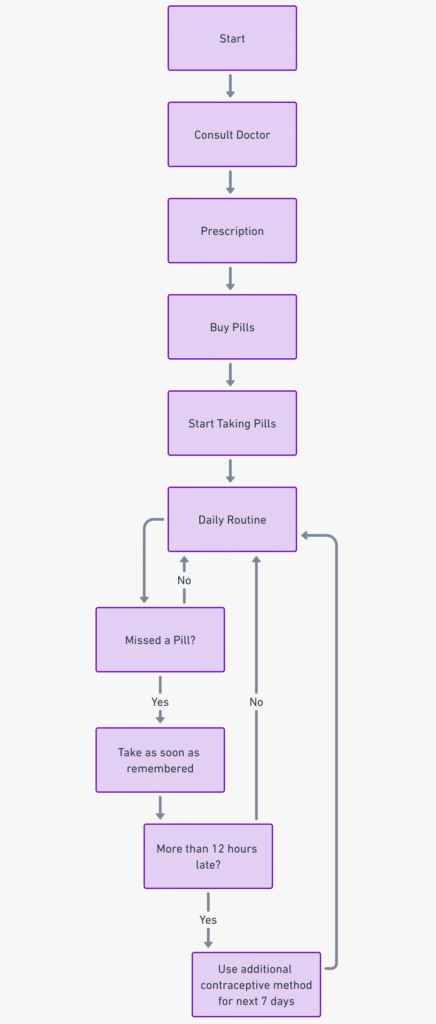Introduction
Oral contraceptive drugs, employed primarily for preventing unwanted pregnancies, embody a range of formulations with distinct pharmacological profiles to cater to individual needs. Here’s a comprehensive overview of their pharmacology, types, recent advancements, adverse effects, and contraindications:

Oral Contraceptive Pills: An Overview
Oral contraceptive pills, often simply referred to as “the pill,” are a type of medication taken daily to prevent pregnancy. They contain synthetic versions of the hormones estrogen and progesterone, which naturally occur in the female body. These hormones regulate a woman’s menstrual cycle and prepare the body for pregnancy. By manipulating these hormones, oral contraceptive pills can effectively prevent ovulation and fertilization.
Classification of Oral Contraceptive Pills
Types of Oral Contraceptive Pills:
Mechanism of Action of Oral Contraceptive Pills
Oral contraceptives curtail the release of gonadotropin-releasing hormone (GnRH) from the hypothalamus, subsequently inhibiting the release of pituitary hormones that stimulate ovulation3.
Mechanism of Action of COCs
COCs work by suppressing the release of follicle-stimulating hormone (FSH) and luteinizing hormone (LH) from the pituitary gland. This prevents ovulation, meaning no egg is released for fertilization. Additionally, COCs thicken the cervical mucus, making it harder for sperm to reach the egg, and thin the lining of the uterus, making it less likely for a fertilized egg to implant and develop.
Mechanism of Action of POPs
POPs primarily work by thickening the cervical mucus, which prevents sperm from reaching the egg. They also thin the lining of the uterus, making it less hospitable for a fertilized egg. Some POPs can suppress ovulation, but this is not their primary mode of action.
Adverse Reactions of Oral Contraceptive Pills
While oral contraceptive pills are generally safe and well-tolerated, they can cause adverse reactions in some women. It’s important to be aware of these potential side effects and to discuss any concerns with your healthcare provider.
Adverse Reactions of COCs
Common side effects of COCs include nausea, breast tenderness, headaches, and mood changes. More serious but rare side effects include blood clots, stroke, and heart attack, particularly in women who smoke and are over 35 years old.
Adverse Reactions of POPs
POPs can cause irregular menstrual bleeding, breast tenderness, and headaches. Because they do not contain estrogen, they have a lower risk of serious side effects compared to COCs.Non-Contraceptive BenefitsThey offer regulatory benefits on menstrual cycles, alleviation from menstrual cramps, and management of acne and hirsutism4.Recent AdvancementsNew formulations have emerged allowing more individualized prescriptions based on women’s specific needs and responses, enhancing individualization and compliance5.Contraindications of Oral Contraceptive PillsAbsolute Contraindications: Include a history of thromboembolic disorders, stroke, coronary artery disease, breast cancer, liver tumors, or undiagnosed abnormal uterine bleeding.Relative Contraindications: Include conditions like migraines, diabetes, gallbladder disease, and a history of depression, where the benefits and risks need to be carefully weighed.
Contraindications of COCs
COCs are contraindicated in women who have a history of blood clots, stroke, or heart attack. They are also contraindicated in women who have certain types of cancer, liver disease, or uncontrolled high blood pressure and in women who smoke and are over 35 years old.
Contraindications of POPs
POPs are contraindicated in women who have breast cancer or liver disease. Unlike COCs, they can be safely used by women who have a history of blood clots, stroke, or heart attack.
Drug Interactions of Oral Contraceptive Pills
Drug Interactions of COCs
Certain medications can decrease the effectiveness of COCs, including some anticonvulsants, antifungals, and HIV medications. COCs can also increase the blood levels of certain drugs, such as cyclosporine and theophylline, which can increase the risk of side effects from these drugs.
Drug Interactions of POPs
Like COCs, certain medications can decrease the effectiveness of POPs, including some anticonvulsants, antifungals, and HIV medications. However, POPs have fewer drug interactions compared to COCs.
Conclusion
FAQs
1. Are oral contraceptive pills 100% effective?
No method of contraception is 100% effective. However, when taken correctly, oral contraceptive pills are over 99% effective at preventing pregnancy.
2. Can I use oral contraceptive pills if I’m breastfeeding?
Yes, you can use oral contraceptive pills while breastfeeding. However, it’s generally recommended to use progestin-only pills as they do not affect milk production.
3. Can oral contraceptive pills cause weight gain?
Some women may experience slight weight gain when they start taking oral contraceptive pills due to water retention. However, long-term weight gain is not a common side effect of these pills.
4. Can I get pregnant as soon as I stop taking oral contraceptive pills?
Yes, you can get pregnant as soon as you stop taking oral contraceptive pills. If you don’t want to get pregnant, you should use another method of contraception.
5. Can oral contraceptive pills protect against sexually transmitted infections (STIs)?
No, oral contraceptive pills do not protect against STIs. To protect against STIs, use a barrier method of contraception, such as condoms.
6. Can I skip my period with oral contraceptive pills?
Yes, you can skip your period with certain types of oral contraceptive pills. This is usually done by skipping the placebo pills in your pill pack and starting a new pack right away.
Key Points:
- Oral contraceptive pills (OCPs) are of four types: Combination pills, Mini pills, Post-coital pills, and Centchroman (non-hormonal).
- Combination pills are the most popular and effective contraceptive method, with a 99-99.5% success rate.
- Combination pills are available in three formulations: Monophasic, Biphasic, and Triphasic, with varying amounts of estrogen and progestin in each phase.
- OCPs work by suppressing gonadotropin secretion, inhibiting ovulation, developing endometrial atrophy, producing viscous cervical mucus, and interfering with ovum and sperm transport.
- Some common side effects of OCPs include nausea, migraine, breast tenderness, mild oedema, headache, and mood changes. Other adverse effects include weight gain, abnormal menstrual bleeding, and increased incidence of thromboembolism, hypertension, and cancers.
- The World Health Organization has developed a list of absolute and relative contraindications to the use of combined OCPs, based on the available evidence of risks.
- Mini pills, which contain only progestin, are given in cases where estrogens are contraindicated and are prescribed soon after delivery.
- Mini pills have a lower success rate (98.3%) compared to combination or phasic pills.
- Post-coital pills are taken after unprotected sex to prevent pregnancy.
- Post-coital (morning-after) pills are emergency contraceptives that can be used after unprotected sex to prevent pregnancy.
- Centchroman is a non-hormonal contraceptive pill that works by inhibiting ovulation and thickening cervical mucus. It is sometimes used as an alternative to hormonal contraceptives.
- Oral contraceptive pills can also provide other benefits besides contraception, such as reducing the risk of ovarian and endometrial cancer, improving acne, and reducing menstrual cramps and bleeding.
- The effectiveness of oral contraceptive pills can be reduced by certain medications, such as antibiotics and anticonvulsants, as well as by vomiting or diarrhea.
- Women who experience certain medical conditions, such as liver disease, migraines with aura, or a history of blood clots, may need to avoid or be cautious when using oral contraceptive pills.
- Women who use oral contraceptive pills should be advised to monitor for side effects and to report any concerning symptoms, such as severe headaches or chest pain, to their healthcare provider.
Quiz (Please note that the quiz can only be accessed on desktops/laptops)
Medical Disclaimer
The medical information on this post is for general educational purposes only and is provided by Pharmacology Mentor. While we strive to keep content current and accurate, Pharmacology Mentor makes no representations or warranties, express or implied, regarding the completeness, accuracy, reliability, suitability, or availability of the post, the website, or any information, products, services, or related graphics for any purpose. This content is not a substitute for professional medical advice, diagnosis, or treatment; always seek the advice of your physician or other qualified health provider with any questions you may have regarding a medical condition and never disregard or delay seeking professional advice because of something you have read here. Reliance on any information provided is solely at your own risk.


